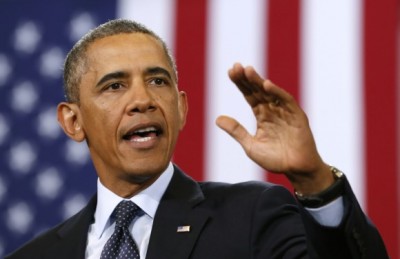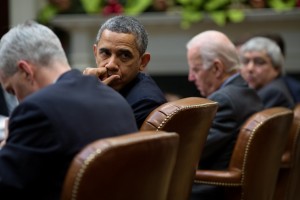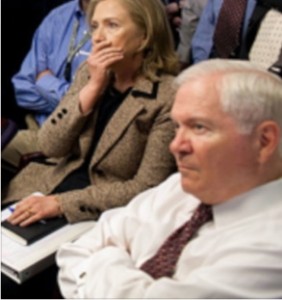Obama’s Deadly Afghan Acquiescence

Occasionally a New York Times writer like Mark Landler will be permitted to step up to the plate and write a sensible article about President “No Guts Obama” and how he caved in to folks whom he lacked the political courage to cross.

President Barack Obama, with Vice President Joe Biden, attends a meeting in the Roosevelt Room of the White House, Dec. 12, 2013. (Official White House Photo by Pete Souza)
Landler’s Jan. 1 article shows, among other things, how Obama’s bowing to heavyweights like Gen. David Petraeus, Defense Secretary Robert Gates, and Secretary of State Hillary Clinton ended up getting thousands of people killed and prolonging the fool’s-errand Afghan war.
The pity, of course, is that Landler’s piece, “The Afghan War and the Evolution of Obama,” comes eight years too late. There is a lot of numbness out there today about how we were all had by “NGO,” together with attempts to blame bad decisions on his benighted advisers. But you know where the buck is supposed to stop. And a number of us, including Veteran Intelligence Professionals for Sanity (VIPS), spared no effort to get through to him in “real time.”
I can understand that some of you will not want to risk being further depressed. Others, however, may wish to be reminded of our efforts to warn President Obama before he let himself be conned into doubling down on the Afghan folly. Those others may want to skim through the re-runs (linked below) of early warnings in March 2009 and January 2010, together with some retrospective comments.
On March 28, 2009, as Obama was beginning his plunge into the Afghan War swamp, I wrote an articled entitled, “Welcome to Vietnam, Mr. President,” which Consortiumnews.com republished last year with the intro: “With still no end in sight for the Afghan War, President Obama can’t say he wasn’t warned. Barely two months into his presidency in 2009, ex-CIA analyst Ray McGovern welcomed Obama to his own Vietnam quagmire.”
Included in that piece was this passage: “Equally relevant to Obama’s fateful early decision on Afghanistan, Gen. Douglas MacArthur told another young President in April 1961: ’Anyone wanting to commit American ground forces to the mainland of Asia should have his head examined.’”
The truth of that advice even eventually sunk into the fellow whom we at the CIA used to call “windsock Bobby Gates” in the days when he was starting his bureaucratic climb to the top by tailoring his positions to please his superiors.
Though Gates helped maneuver Obama into a pointless Afghan “counterinsurgency surge” in fall 2009, Gates later told aspiring officers at West Point: “Any future defense secretary who advises the president to again send a big American land army into Asia or into the Middle East or Africa should ‘have his head examined,’ as General [Douglas] MacArthur so delicately put it.”
My “Welcome to Vietnam, Mr. President” article of March 28, 2009, also noted: “When JFK’s top military advisers, critical of the President’s reluctance to go against [MacArthur’s] advice, virtually called him a traitor — for pursuing a negotiated solution to the fighting in Laos, for example — Kennedy would tell them to convince Gen. MacArthur first, and then come back to him. (Alas, there seems to be no comparable Gen. MacArthur today.)”
Leaked Doubts
On Jan. 27, 2010, I was back at it again, citing the belated disclosure that U.S. Ambassador to Afghanistan Karl Eikenberry had tried to warn President Obama against escalating the Afghan War. I wrote:

Defense Secretary Robert Gates and Secretary of State Hillary Clinton on May 1, 2011, watching developments in the Special Forces raid that killed Osama bin Laden. Neither played a particularly prominent role in the operation. (White House photo by Pete Souza)
“I imagine that in years to come, Eikenberry will proudly show his cables to his grandchildren. Or maybe he won’t, out of fear that one of them might ask why he didn’t have the guts to quit and let the rest of the country know what he thought of this latest March of Folly.”
Eikenberry is an interesting case study showing, among other things, that lack of guts on the part of a commander-in-chief can be contagious. A retired Lt. General and then Obama’s ambassador in Kabul, Eikenberry knew more about Afghanistan than the so-called “Gang of Five” – Gen. Petraeus, Gen. Stanley McChrystal, Defense Secretary Gates, Secretary of State Clinton, and special envoy Richard Holbrooke – put together.
Eikenberry sent back to Washington some very important, sensible advice, though we don’t know whether Clinton forwarded the cables on to her boss. Nor do we know whether Eikenberry exercised his ambassadorial prerogative to contact the President directly.
Eikenberry had served three years in Afghanistan over the course of two separate tours of duty. During 2002-2003, he was responsible for rebuilding Afghan security forces. He then served 18 months (2005-2007) as commander of all U.S. forces stationed in the country. Surely, he could see the toll in killed and wounded that would inevitably result from the hopeless counterinsurgency strategy being urged on “NGO” by the “Gang of Five.”
And Eikenberry’s cables show that he felt strongly about it. He also knew, of course, that Obama was about to let himself be sandbagged by the Gang and its clever use of the media. So he sent two SECRET NODIS (“NODIS” means No Dissemination) cables to Clinton, who was his boss (and who – along with Gates – was one of what Gates called the “un-fireables”). Eikenberry surely doubted that Clinton would share his advice with Obama, but did Eikenberry ever think of resigning loudly on principle? Apparently not.
So, what did he do when he was overruled? He trod up to Congress and fully supported the feckless surge of troops launched out of the cowardice/stupidity of “NGO” in bowing to the “Gang of Five.” It probably never occurred to Eikenberry to blow the whistle on the “tough guy/gal” policy which would end up getting a thousand or so U.S. troops killed along with a much larger number of Afghans.
For many a graduate of West Point, the academy’s motto seems to get garbled as they climb the ladder of success. Instead of “Duty, Honor, Country,” it becomes “Career, President, Sinecure Retirement.” Perhaps blowing the whistle did occur to Eikenberry. But if you challenge the Establishment in that way, you seldom end up with a cushy job like running a Research Center at Stanford.
Presumably, Eikenberry takes some gratification now in the fact that he turns out to have been correct in his bleak assessment of the “surge” in Afghanistan. He may even have been the one behind eventually leaking his cables to The New York Times, thus earning him applause from his academic colleagues.
But his burnished credentials didn’t save the lives of the soldiers tossed into the Afghan meat grinder or the many civilians who died needlessly as senior U.S. government officials put ideology and careerism – the need to look tough – ahead of what made sense for either Afghanistan or the United States.
In the end, however, the bloody futility of the past eight years in Afghanistan rest most heavily on the “Gang of Five” and the easily outmaneuvered “NGO,” who sits at the desk where the buck stops.
Ray McGovern works with Tell the Word, a publishing arm of the ecumenical Church of the Saviour in inner-city Washington. He was an Army Infantry/Intelligence officer and then CIA analyst for a total of 30 years, and is now a member of the Steering Group of Veteran Intelligence Professionals for Sanity (VIPS).

